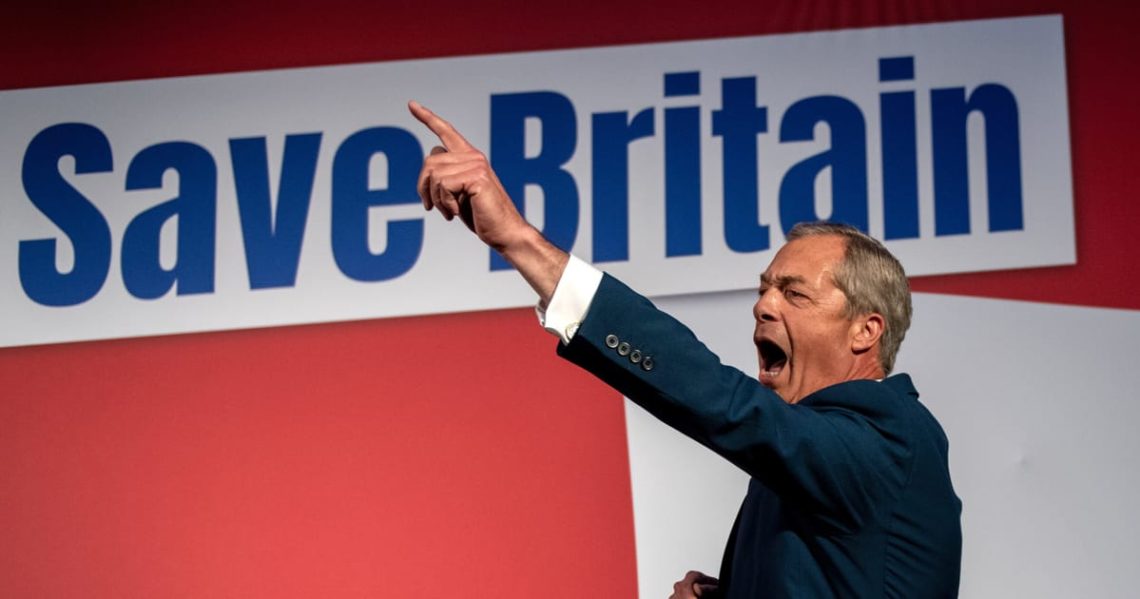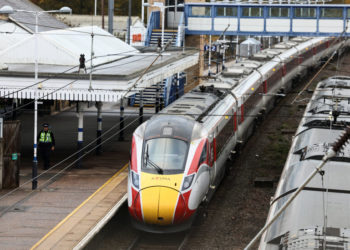LONDON — British politics has few landmines as explosive as the triple lock.
The policy of raising the U.K. state pension each year by either inflation, average earnings or 2.5 percent — whichever is highest — has trapped Britain’s two main parties since 2012 in a bind that, for some, has come to symbolize the paralysis of the state.
Despite economists lining up to warn it will become unsustainable, neither the ruling Labour Party nor opposition Conservatives — each fighting for the “grey vote” — dare touch it. Not even now, when Chancellor Rachel Reeves is mulling a manifesto-breaching rise in income tax to balance stricken public finances in her Nov. 26 budget.
Yet Reform UK is different.
Nigel Farage’s insurgent party, enjoying a poll lead that puts it on track to form the next government in 2029, is remarkably open about considering whether the policy should survive.
“Let’s be clear, we’ve said we don’t guarantee it,” Reform Deputy Leader Richard Tice told POLITICO in an interview.
“Everything’s up for review, because nothing’s affordable if we keep spending more than we’re earning. And we’ve said that consistently … if we the country go bust, which is the direction of travel we’re heading, one way or the other, nothing’s affordable.”
Any decision appears a long way off; Farage has said he will decide “between now and the next election,” while one senior ally predicted a decision might not even come in 2026. (They were granted anonymity to speak freely, like others quoted in this article.)
But when Farage does make up his mind, he has the power to radically alter the political landscape in the U.K. — and set a new bar for insurgent parties across Europe telling hard truths that the center cannot. He would also come under ferocious attack.
Radical change to public sector pensions
The triple lock is not even the biggest policy change being looked at by Reform, according to Tice.
Others include scaling back state employees’ use of defined benefit pension schemes — typically more generous than other workplace pensions. Defined benefit schemes covered 82 percent of public sector workers in 2021 according to the Institute for Fiscal Studies think tank.
Tice said: “You’re not asking about the much, much bigger issue, right — which is, how long can we carry on offering defined benefit pensions to all public sector workers?
“That is a much, much bigger issue that is not properly discussed in Westminster, in the media and so on. All [these issues], they’re all related. They’re all important, and they all fit into a jigsaw.”
Tice said his party is “at base camp on Everest” in examining state spending and wants to ask “fundamental questions about all of these big issues.”
Asked what he thought might replace defined benefit pensions for public sector workers in the future, Tice replied: “That’s where patience is a virtue. These are such big issues — you don’t answer them in a day, a week, frankly, or a month.”
‘We’re properly in the shit’
Decisions on issues like these show the tension at the heart of Farage’s project.
Reform is a populist party, accused by critics of saying what voters want to hear, yet it is also an insurgent movement with the political license to slash the state and say the unsayable. At the same time, Farage is seeking to reassure voters he will be fiscally responsible, after Tory strategists decided to fight him on the economy and he junked £90 billion of promised tax cuts that were in his 2024 manifesto.
These tensions may be apparent when Farage gives his most significant speech on the economy yet in the City of London on Monday.
Achieving all these things at once will involve letting some people down — and Reform knows it.
One senior figure in Reform said: “There is a real determination to be serious about the economy. Nigel’s speech is the start of that.
“We’re not going to be rushing into headline commitments on big questions at this stage, but by the same token that does mean that everything is on the table. We feel there hasn’t been a proper economic resetting since the Thatcher era really, and certainly since Blair and Brown.”
Tice — who will give his own City speech on Wednesday — added: “The mistake the press are making is you focus on an issue, you try and terrify politicians [who say] ‘oh no, I can’t go there, I can’t go there, I can’t go there,’ which means you can’t go anywhere, which means the country continues to be driven into the ground.
“You’ve actually got to take a step back, re-look at the whole picture and say we’re in the shit. We’re properly in the shit. And we need to re-look at a whole bunch of big issues.”
Under lock and key
The triple lock is big, all right. The Conservatives introduced it in 2012 to reverse an historic decline and tackle pensioner poverty. But it will now cost the state an extra £15.5 billion a year by 2029, three times more than expected. If it continued until the 2070s it would take up an extra 1.5 percent of U.K. GDP, according to the Office for Budget Responsibility watchdog.
The mechanism is the hard bit. One senior Reform figure suggested the priority should be raising the threshold at which adults pay income tax. This would allow pensioners to keep more of their private or workplace pensions, even if state pension growth slows down.
A Conservative ex-Cabinet minister suggested Britain should decide the proportion of average earnings it wants the state pension to hit, then scrap the triple lock once it is reached — and raise pensions only by earnings (the legal minimum).
A former Tory Treasury minister added: “It would take a proper crash like the dot com bubble, and someone would have to be brave. But to be brave you have to be prepared to lose.”
Conservative politicians have the benefit of already losing the 2024 election. As such, some are now brave enough to start questioning the triple lock.
They range from the center-right former Deputy Prime Minister Damian Green and ex-Security Minister Tom Tugendhat, to right-wing peer David Frost — who is in contact with the Reform-backing Centre for a Better Britain think tank — and the socially conservative former MP Miriam Cates.
Right-leaning think tanks including the Institute of Economic Affairs and Policy Exchange have come out in favor of scrapping the lock too. Right-wing ex-MP Jonathan Gullis, a senior fellow at the Centre for Social Justice, think tank, is also sympathetic.
Robert Colvile, the director of the center-right Centre for Policy Studies who has long railed against the policy, told POLITICO: “For years it’s been clear to everyone who’s looked at the public finances that the triple lock is unsustainable — and increasingly unfair given that so much of the extra money goes to the already wealthy.
“If Farage really does commit to replacing the triple lock with a more sustainable alternative, it will not only be an extremely welcome — and courageous — move, but would allow Reform to depict themselves as the real party of fiscal discipline.”
Let slip the dogs of war
But this would also give Labour and the Tories a choice: use Reform’s action as an excuse to finally do the same — or go on the attack.
Not only did most Tory and Labour strategists who spoke to POLITICO think their parties would pick the second option, some salivated at the prospect.
“I would love them to,” said one long-time Conservative strategist. “Economically, obviously the triple lock is insane … but I just think it would be the biggest gift to the Tories right now.”
A second Tory strategist argued they would be “even less likely” to change tack if Reform did so. “If you are the ones that follow suit and go second, you don’t get any credit,” they said.
A long-serving Labour strategist agreed it would “give you a campaign.” When Conservative Leader Kemi Badenoch initially did not commit outright to keeping the lock in July, Labour accused her of wanting “to slash the state pension for 11 million people.” (Badenoch later said “we stand by” the lock.)
Reform strategists know this but still do not rule out the prospect. Polling shows Reform is less heavily reliant than Conservatives on the votes of over-65s. The first senior figure quoted above said: “I don’t think we have quite the sense of the sacred cow that the Tories do.”
Even so, many opponents doubt that Reform would ever actually promise to scrap the policy.
“There isn’t a cat’s chance in hell of them doing that,” said one shadow Cabinet minister, who pointed out that Reform’s rise in the polls has leveled off since May.
The long shadow of winter fuel
Labour aides are all the more jittery after their party tried to means-test a £300 annual handout for pensioners’ energy bills. The raid on the winter fuel payment prompted virulent hostility on doorsteps and an eventual U-turn.
One person working for a prominent think tank said the idea of Labour moving on the triple lock next year is “underpriced … I think they will come to a realisation that they have burnt so much capital with the winter fuel payment stuff that they might as well rip the plaster off.”
But a Labour government adviser argued the exact opposite. “The long shadow of winter fuel in No. 10 is longer than the media have realized,” they said. “It was such a botched job, and the reversal of it was so awful and painful and used up so much political capital, that actually it wouldn’t be worth it.”
That means conversations about the lock remain confined to pubs and not policy meetings, even as many in Westminster feel something will have to give. Pensions Minister Torsten Bell is among those who called for the triple lock to be replaced before he entered frontline politics.
One government minister said: “The consensus view is that if there was a way to keep protecting pensioners, but not with the precise mechanism of the triple lock, people would choose that. But I don’t think people think that is politically possible.”
A Labour MP added: “I would be quite content to drop it; most of the people who voted for me are younger. A lot of my colleagues are in a different position.”
Reasons to keep the faith
There are also plenty of MPs who argue — some passionately — that the triple lock remains an essential mechanism to hold back pensioner poverty.
A senior ally of Badenoch predicted the Conservatives would keep the policy, because any real-terms reduction in pension rates would push more people onto the state benefit Pension Credit.
Westminster is also now full of millennial MPs who have been unable to save meaningfully for their retirements after the 2008 crash. One of those MPs said Labour colleagues should be looking three decades ahead: “The triple lock would actually give us a pension that is worth living to. I worry that if you take that away, you take away the last thing that is good.”
Reform will have to mull over all these tricky questions.
The conversation will not be easy. While held together by the figurehead of Farage, the key figures in Reform have divergent takes on policy and the world. Its Head of Policy Zia Yusuf is focused on tech while Deputy Leader Tice focuses on City regulation.
“We call ourselves an entrepreneurial political startup,” said Tice. “I say we’ve probably moved into our 20s. We’re through our 21st, we’ve left university. So I think that’s a sort of analogy of where we’re at in human development. We work hard, very energetic, lots of exciting thoughts, plans, ideas. But you never stop learning in life.”
If Farage does ever want to slay this sacred cow, he’ll do a lot of learning and fast.
The post Will Nigel Farage slay British politics’ most sacred cow? appeared first on Politico.




